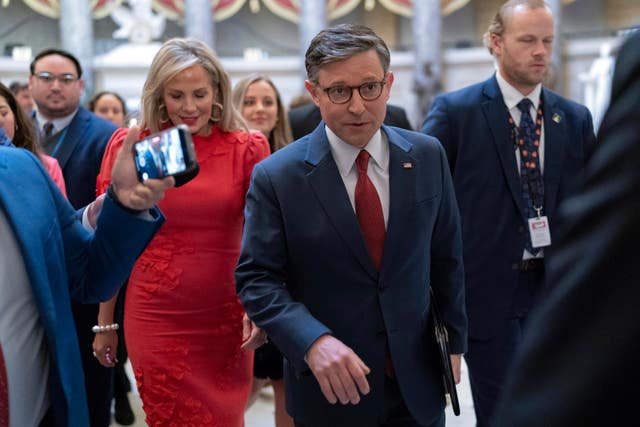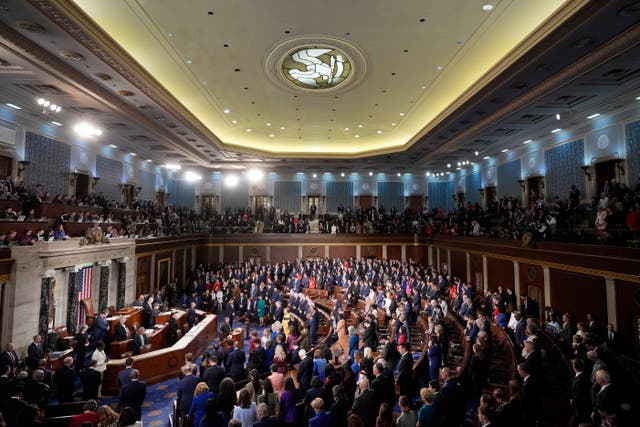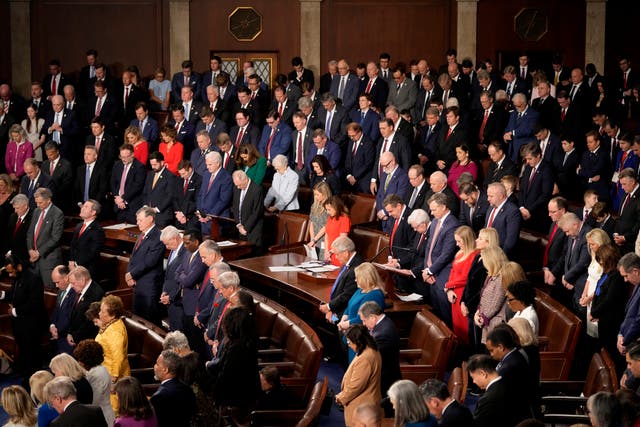Republican Mike Johnson has narrowly won re-election to the US House of Representatives speakership on a first ballot, overcoming hard-right Republican holdouts after a tense standoff and buoyed by a nod of support from President-elect Donald Trump.
The uneasy scene brought an ominous start to the first day of the new Congress.
A small collection of hardline Republicans convened in the back of the House chamber, one by one declining to vote or choosing another legislator.

In the end, however, Mr Johnson was able to flip two remaining holdouts who switched to support him, drawing applause from Republicans.
The tally was 218-215.
Mr Johnson in his first speech vowed to “reject business as usual” as Republicans take charge.
“We’re going to drastically cut back the size and scope of government,” he promised.
Mr Johnson’s weak grip on the gavel has threatened not only his own survival but President-elect Trump’s ambitious agenda of tax cuts and mass deportations as Republicans sweep to power.
Even his close alliance and backing from Mr Trump himself, usually a sure bet for Republicans, was no guarantee Mr Johnson would stay in power.
The House Democratic leader Hakeem Jefferies attempted to push past the Republican tumult of the past two years, saying it was time to come together and put party politics aside “to get things done” for Americans.

A flop by Mr Johnson could have thrown Monday’s congressional certification of Mr Trump’s 2024 election victory into turmoil without a House speaker.
“A win for Mike today will be a big win for the Republican Party,” Mr Trump posted ahead of the vote on social media.
Congress has been here before, when it took Republicans nearly a week and 15 rounds of voting to elect Kevin McCarthy as speaker in 2023, a spectacle otherwise unseen in modern times.
Mr McCarthy was then dumped by his party, a historic first, but he was also part of a long list of Republican speakers chased to early exits.
The stakes are higher this year as Mr Trump prepares to return to the White House with the House and Senate in Republican control and promising to deliver big on a 100-day agenda.
Mr Johnson worked diligently to prevent losing his post, up to the final moments, spending New Year’s Day at Mar-a-Lago as he positioned himself alongside Mr Trump.
The speaker often portrays himself as the “quarterback” who will be executing the political plays called by the “coach”, the president-elect.

He was falling short.
As the chamber stood still, a few Republican holdouts announced their support, but it was still not enough for Mr Johnson to keep the gavel.
One hard “no” was Representative Thomas Massie, (Republican-Kentucky), who voted for a different Republican leader, as did two other Republicans.
Mr Johnson’s allies huddled with some legislators, and others took calls, passing their phones to the other holdouts.
But Mr Johnson had also warned that without a House speaker there would be a “constitutional crisis” heading into January 6, when Congress by law is required to count the electoral votes for president, weeks before Mr Trump is set to be inaugurated on January 20.
“We don’t have any time to waste, and I think that everybody recognises that,” he said.
Mr Johnson commands one of the slimmest majorities in modern times, having lost seats in the November election.

That leaves Mr Johnson relying on almost every Republican for support in the face of Democratic opposition.
Heading into Friday he did not have the full support needed.
Texas Republican Representative Chip Roy was among the most notable holdouts, an unflinching member of the Freedom Caucus who lashed into the Republican leadership’s handling of the year-end spending bill for failing to cut spending and adhere to House rules.
“Something MUST change,” Mr Roy posted on social media.
He eventually voted for Mr Johnson.
What is unclear is what other concessions Mr Johnson can make to win support.
Two years ago, Mr McCarthy handed out prime favours that appeared to only weaken his hold on power.
Already, Mr Johnson has clawed back one of those changes, with a new House rule pushed by centrist conservatives that would require at least nine members of the majority party on any resolution to oust the speaker – raising the threshold Mr McCarthy had lowered to just one.
“Just know that Trump is right all the time, it’ll help you make a decision real simple.”
In many ways, Mr Johnson has no choice but to endure political hazing by his colleagues, as they remind him who has leverage in their lopsided relationship.
He was a last-ditch choice for the office, rising from the back bench once other leaders failed in the aftermath of Mr McCarthy’s ouster.
The speaker’s election is set to dominate the opening of the new Congress, which also brings a roster of history-making members, as the Senate expects to quickly begin hearings on Mr Trump’s nominees for top cabinet and administrative positions.
In the Senate, two black women – Lisa Blunt Rochester of Delaware and Angela Alsobrooks of Maryland – were being sworn in, both wearing suits in the white of the suffragettes, the first time in the nation’s history two black women senators will serve at the same time.
Senator-elect Andy Kim of New Jersey is also making history as the first Korean American to join the chamber.
In the House, Sarah McBride is the first openly transgender person in the Congress.
And Speaker Emerita Nancy Pelosi, who recently suffered a fall overseas and underwent hip replacement surgery, will make her own return to Washington, a reminder of the power she wielded when Democrats last held the majority.






